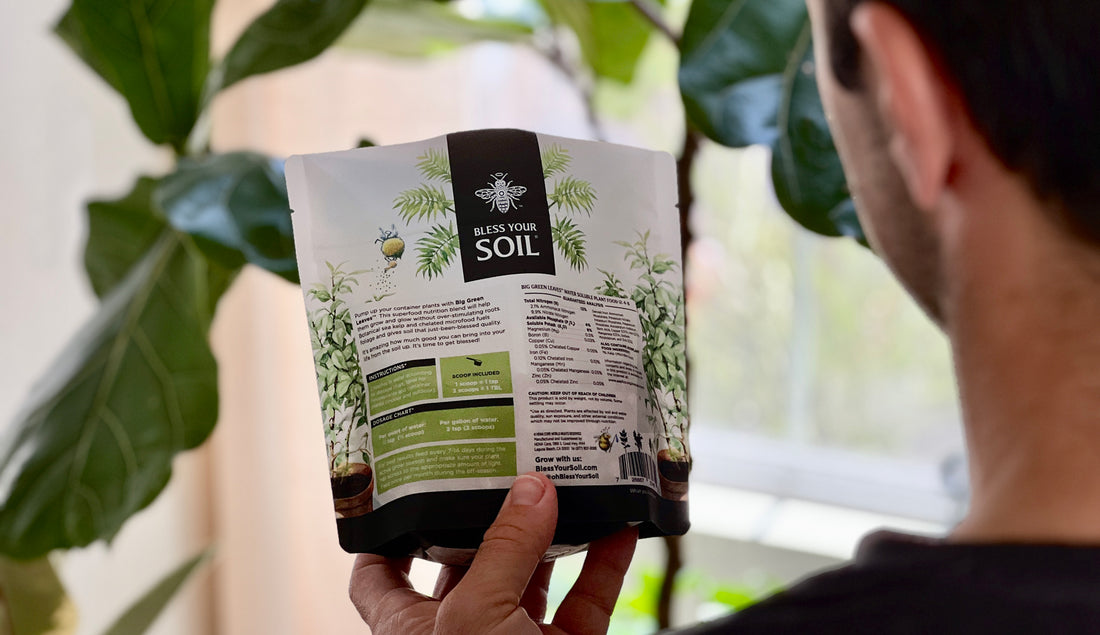
Are you ready to learn a thing or two about fertilizer? We sure hope so because we're here to talk about the ever-mysterious 3-1-2 NPK ratio. Likely you're here because you have a leafy houseplant and heard it's the so-called golden ratio of plant food for leaf growth.
The Mystery of 3-1-2 NPK Demystified
This little ratio is the perfect balance of Nitrogen (N), Phosphorus (P), and Potassium (K) to fertilize some of your green friends. But here's the thing, the 3-1-2 NPK ratio is just that, a ratio. In other words, with the ratio of nitrogen 3 times higher than some of the other nutrients, this indicates that the fertilizer supports leaf growth in plants as opposed a fertilizer that encourages blooms and so on. So, while it's a great guideline to follow, it doesn't necessarily mean that those actual nutrient values in your fertilizer are perfect.
ra·tio
ˈrāSH(ē)ō
Relation between two or more amounts showing the number of times one value contains or is contained within the other.
Let's read on...
First, don't take it literally.
Before you start frantically searching for a fertilizer that only contains 3% nitrogen, 1% phosphorus, and 2% potassium, let us stop you right there. That's not how it works, plant friends. Those are just the minimum percentages of each nutrient that are required to be labeled as a 3-1-2 NPK fertilizer. So, unless you're trying to grow some weakling plants, steer clear of those low-value fertilizers. It's just a waste of your hard-earned cash.
Nitrogen (N) is the superstar nutrient for leafy growth, making your plant look like a green goddess!
Phosphorus (P) is the root-booster and flower-powerhouse, helping your plant develop a strong foundation and a stunning bloom.
Potassium (K) is the MVP of plant nutrition, ensuring that everything runs smoothly and your plant is the picture of health.
Don't get caught under the low-hanging fruit.
Let's face it, plant chemistry is complicated. We don't even like to think about it, so it makes sense that certain brands go for the lowest hanging fruit and offer up a literal 3-1-2 NPK ratio liquid or tablet fertilizer. We've noticed a TON of fertilizers on the market with these low values, charging you up to $26 for a mere 8-ounce bottle containing just 3% nitrogen, no trace minerals, and 94% water.
“Unless you're trying to grow some weakling plants, steer clear of those low-value fertilizers. It's just a waste of your hard-earned cash.”
So, what should you be looking for instead? Well, let us introduce you to the star of the show — fertilizers with a higher values of this ratio at 12-4-8 NPK. Yes, you read that right. Twelve percent nitrogen, four percent phosphorus, and eight percent potassium (p.s. this is a 3-1-2 ratio). That's the magic value combination for your houseplants! This will give your plants the much needed boost they deserve, and it's still gentle enough to use on a constant basis with no risk of burning leaves or roots.
This 12-4-8 NPK concentration is in Big Green Leaves®, a universal houseplant fertilizer from Bless Your Soil®.
What else is important besides the NPK Ratio?
But wait, there's more... In addition to the holy trinity of NPK, you should also look for fertilizers that contain trace minerals or "micro" nutrition. These micronutrients, such as iron, zinc, boron, and manganese, to name a few, are essential for plant growth and development. So, don't skimp on the good stuff—which, sadly, many fertilizers leave out (or they get it wrong because of, well, chemistry).
It’s also important to look for fertilizers that contain a complete set of trace minerals or "micro" nutrition for quality growth.
If you're looking at the plant food label and only see a guarantee of nitrogen, phosphorus, and potassium, that's all you're getting and your plant is going to be hungry. Think of this this way, your plants are living organisms and they need well-rounded nutrition, just like you. This is why Bless Your Soil® supplies a complete spectrum of micro food in the form of organically-bonded minerals for long term plant health.

About organically-bonded minerals
"What are organically-bonded minerals"? you ask—
Without getting too technical, organically-bonded minerals are minerals which are stabilized to be available to your plant without interacting with the air or water. Most plant foods do not provide this level of quality. To make a comparison, it's sort of like getting your protein from a medium-rare cut of filet mignon as opposed to a leather belt—one form of protein is just way more available biologically than the other. You can identify organically-bonded minerals on the label by the word "chelate" on the label. It's a small but important aspect of fertilizer composition.
Big Green Leaves® has a urea-free, 3-1-2 NPK ratio plus the added benefit of organic, botanical sea kelp for rich leaf growth and a healthy plant microbiome.
Bless Your Soil® packs superfood organic nutrition with concentrated, yet gentle, minerals for pro-quality, long-term plant growth. Shop Big Green Leaves®.
Enhanced Biologicals
Further, you'll be able to spot a fertilizer company that actually cares about your plant by the guarantee of support nutrients contained in the formula. Our go-to treats for plants are botanical sea kelp (aka seaweed extract), and yucca extract. These organic compounds go a long way towards plant health (we’ll cover that, and how to read your fertilizer label in another article).
Sea kelp offers a range of unique benefits such as stress tolerance, nutrient uptake, growth, and yield.
The NPK Takeaway
In conclusion, understanding the 3-1-2 NPK ratio is crucial when it comes to fertilizing your plants. While it's a great guideline to follow, it should not be taken literally. Instead, look for fertilizers with a higher concentration of nutrients and a complete spectrum of chelated micronutrients. Bonus points if the company also includes organic compounds, such as botanical sea kelp and yucca extract in their formula - that shows they really care about your plant's health! (Yes, we're referring to ourselves at Bless Your Soil®)
By being selective and paying attention to the nutrient values, you can save some green while ensuring your plants get all the nutrition they need to thrive. Happy planting!
Sciencey References
Ali O, Ramsubhag A, Jayaraman J. Biostimulant Properties of Seaweed Extracts in Plants: Implications towards Sustainable Crop Production. Plants (Basel). 2021;10(3):531. Published 2021 Mar 12. doi:10.3390/plants10030531
E. G.Wulffa*, E. Zidab, J. Torpa and O. S. Lunda a. Yucca schidigera extract: a potential biofungicide against seedborne pathogens of sorghum. University of Copenhagen, Faculty of Life Sciences, Department of Agriculture and Ecology, Danish Seed Health Centre.






